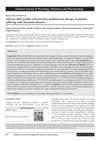 16 citations,
August 2011 in “Annals of Allergy Asthma & Immunology”
16 citations,
August 2011 in “Annals of Allergy Asthma & Immunology” A woman with severe angioedema improved significantly after treatment with rituximab.
[object Object]  9 citations,
October 2008 in “Mutation research”
9 citations,
October 2008 in “Mutation research” N-acetyl-L-cysteine (NAC) can prevent DNA damage and protect cells from harm.
 6 citations,
September 2017 in “Journal of health psychology”
6 citations,
September 2017 in “Journal of health psychology” Women who had cancer treatment feel both positive and negative about their bodies.
 4 citations,
May 2007 in “Oral and Maxillofacial Surgery Clinics of North America”
4 citations,
May 2007 in “Oral and Maxillofacial Surgery Clinics of North America” Understanding gender differences and individual patient characteristics is essential for optimal cosmetic surgery outcomes.
 April 2024 in “Cell death and disease”
April 2024 in “Cell death and disease” Long COVID causes various long-term health issues and needs better awareness and treatment.
 March 2024 in “Biomedical reports”
March 2024 in “Biomedical reports” Isoflavone may help manage PCOS symptoms, but its effectiveness is uncertain.
 January 2024 in “Forte Journal”
January 2024 in “Forte Journal” The hair oil with lemongrass and coconut oil promotes hair growth effectively.
 January 2023 in “National journal of physiology, pharmacy and pharmacology”
January 2023 in “National journal of physiology, pharmacy and pharmacology” Low-dose methotrexate is generally safe but can cause mild to severe side effects, and folic acid can reduce these risks.
15 citations,
April 2008 in “Headache” People with migraines often have mental health conditions, and treatment should be personalized to address both issues safely.
 1 citations,
January 2022 in “Monaldi archives for chest disease”
1 citations,
January 2022 in “Monaldi archives for chest disease” After severe COVID-19, lung damage can improve, detected effectively by lung-ultrasound, and high pressure support during hospitalization can increase lung artery size. Also, about 22% of patients had lung blood clots, and when treated, they recovered faster.
 113 citations,
June 2019 in “F1000Research”
113 citations,
June 2019 in “F1000Research” Scarless healing is complex and influenced by genetics and environment, while better understanding could improve scar treatment.
53 citations,
August 2014 in “Cochrane library” Methotrexate is not proven effective for inducing remission in ulcerative colitis.
41 citations,
February 2021 in “Translational research” Non-coding RNAs could help detect and treat radiation damage.
41 citations,
July 2016 in “Radiation Research” Radiation damages salivary glands by harming blood vessels, but antioxidants might help protect them.
37 citations,
October 2017 in “JEADV. Journal of the European Academy of Dermatology and Venereology/Journal of the European Academy of Dermatology and Venereology” Scalp cooling effectively reduces hair loss from chemotherapy.
 19 citations,
November 2021 in “Reviews in endocrine and metabolic disorders”
19 citations,
November 2021 in “Reviews in endocrine and metabolic disorders” Sex hormones like estrogen and testosterone may affect COVID-19 severity differently in men and women, potentially influencing prevention and treatment strategies.
 15 citations,
September 2021 in “Archives of Plastic Surgery”
15 citations,
September 2021 in “Archives of Plastic Surgery” The document concludes that facial feminization surgery improves psychological well-being and social acceptance for transgender individuals.
 December 2024 in “Journal of the International Society of Sports Nutrition”
December 2024 in “Journal of the International Society of Sports Nutrition” Creatine monohydrate is safe and effective for muscle recovery and performance, especially for those with low creatine levels.
 February 2024 in “Endocrinology and Disorders”
February 2024 in “Endocrinology and Disorders” Balanced hormones are crucial for women's health, and can be managed with lifestyle changes or hormone therapy if needed.
[object Object]  June 2023 in “Pharmaceuticals”
June 2023 in “Pharmaceuticals” Men and women respond differently to drugs for COVID-19, high cholesterol, and diabetes, which suggests a need for personalized treatments.
March 2022 in “IntechOpen eBooks” PCOS affects many aspects of health, not just fertility, and needs comprehensive treatment.
 17 citations,
April 2015 in “Tropical Journal of Pharmaceutical Research”
17 citations,
April 2015 in “Tropical Journal of Pharmaceutical Research” Asiasari Radix et Rhizoma is safe and has potential for new drug development due to its therapeutic properties.
 11 citations,
July 2012 in “Current Opinion in Pediatrics”
11 citations,
July 2012 in “Current Opinion in Pediatrics” Skin problems can be signs of hormone-related disorders and recognizing them early is important for treatment.
 263 citations,
February 2013 in “Wiley interdisciplinary reviews. Nanomedicine and nanobiotechnology”
263 citations,
February 2013 in “Wiley interdisciplinary reviews. Nanomedicine and nanobiotechnology” Polymeric nanoparticles show promise for treating skin diseases.
 219 citations,
March 2004 in “Journal of The American Academy of Dermatology”
219 citations,
March 2004 in “Journal of The American Academy of Dermatology” 5% and 2% minoxidil solutions effectively promote hair growth and reduce hair loss, with 5% being slightly more effective but having more side effects.
205 citations,
January 2005 in “Skin pharmacology and physiology” Liposomes and niosomes can help drugs penetrate the skin better.
 202 citations,
June 2005 in “Aaps Pharmscitech”
202 citations,
June 2005 in “Aaps Pharmscitech” Lecithin organogels could be good for applying drugs to the skin because they are stable, safe, and can improve drug absorption.
 188 citations,
October 2012 in “The AAPS Journal”
188 citations,
October 2012 in “The AAPS Journal” The document concludes that developing generic topical drugs requires ensuring they match the original in quality, composition, and structure, and often involves complex testing and regulatory steps.
 138 citations,
August 1985 in “Journal of The American Academy of Dermatology”
138 citations,
August 1985 in “Journal of The American Academy of Dermatology” Minoxidil promotes hair growth in male pattern baldness.
133 citations,
July 2006 in “International Journal of Dermatology” The cream effectively and safely reduces facial hair in women.






















